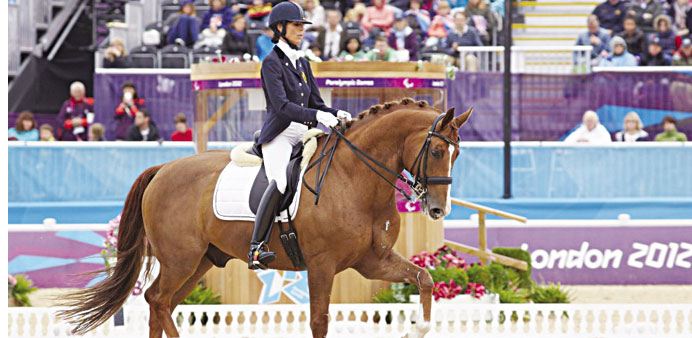Belgium’s Michele George won both individual titles at World Equestrian Games in France last year with her gelding FBW Rainman, now 13.
By Sports Reporter/Doha
Para-Equestrian Dressage makes its debut today in Doha at the CHI Al Shaqab 2015 competition at the Al Shaqab arena. This discipline might well be the most convincing proof that horses are mankind’s most honest servants. It is the only equestrian discipline that is included in the Paralympic Games, where it has been a regular fixture since 1996.
CHI Al Shaqab is offering a platform for riders with impairments, celebrating three competitions: one for teams and two for individuals with a set programme and a freestyle. Their competitions are scheduled for today, tomorrow and Saturday, finishing with their Grand Prix Freestyle.
With the idea of creating opportunities for all people with impairments to compete and achieve their goals in equestrian sport, athletes are classified according to the level of their impairment so as to provide for meaningful competition. In 2006, Para-Equestrian joined the ranks of the other seven disciplines regulated by equestrian world’s governing body FEI (International Equestrian Federation).
At the most recent world championship 2014 in France, Great Britain dominated again, winning the team competition and Lee Pearson claiming his seventh world title. Like any other rider para dressage athletes rely on bringing up new horses for competition but their partnership might be an extra special one because of their bodily impairments.
Among the top nominations for CHI Al Shaqab 2015 are Elke Phillip from Germany, Dutch Rixt van der Horst, Ann Cathrin Luebbe from Norway and Belgian Michele George. All four won medals at the World Equestrian Games, George and van der Horst are twice world champions. Now they will be the pathfinders in the Gulf region for their very special discipline.
The happily smiling 41-year-old Michele George took France by storm, winning both individual titles with her gelding FBW Rainman, now 13, adding to a previous gold at WEG Lexington and a silver at the Olympic Games in London.
Michele George believes that the strong competition within the sport, and particularly her grade IV, can only be good for the sport of para dressage, “If there are no other riders who are competitive then there is no sport,” she said in Caen, France after her winning ride, “so we have to try to be the best all of the time. For me it is necessary, otherwise I quit.”
How para dressage works? Just like any other dressage competition where horse and rider have to act in harmony and silent understanding.
In para dressage, however, the competitor’s mobility, strength and coordination are assessed in order to establish their classification profile. People with similar functional ability profiles are grouped into competition grades. The grades range from grade Ia for the most severely impaired, to Grade IV for the least impaired.
The competition within each grade can therefore be judged on the skill of the individual competitor on their horse, regardless of the competitor’s impairment.

